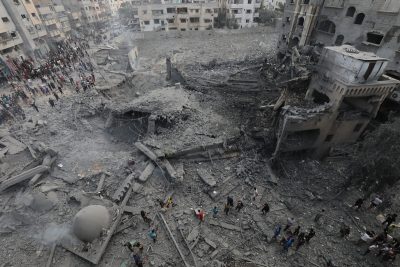Palestine Letter: Israel Is Imposing a Blackout on Gaza to Hide a Massacre
Israel is slowly cutting off Gaza's communications with the outside world, because it wants to prevent us from revealing the massacres it is committing.

All Global Research articles can be read in 51 languages by activating the Translate Website button below the author’s name.
To receive Global Research’s Daily Newsletter (selected articles), click here.
Click the share button above to email/forward this article to your friends and colleagues. Follow us on Instagram and Twitter and subscribe to our Telegram Channel. Feel free to repost and share widely Global Research articles.
***
I pack some of my clothes, identifying documents, belongings, and batteries to charge my phone and stay connected to the situation around me. My family and I are evacuating our home in the al-Shuja’iyya neighborhood east of Gaza. I definitely need a larger bag to fit my life into it.
In the afternoon of the second day of the attack, the Israeli army sent a message to my eldest brother — we all live in the same building — telling him that he must evacuate the building and head to the center of Gaza City.
I live on the ground floor. My elderly mother, who is blind, lives with me and my wife alongside our nine-month-old boy, who has already witnessed two Israeli wars in his short life.
“We need to evacuate right now while we have time,” my brother Hani tells me. “If night falls and we’re still here, we’ll be in danger.”
I try to tell him that we should stay — I think no place in Gaza is safe from Israel’s warplanes. But we’re both right.
I make dozens of calls to people to find an apartment for my family, but I don’t want to go to another residential tower — I have already reported on how many of them are the first sites to go in an Israeli airstrike.
Everyone I call tells me that if I manage to find somewhere safe, I should take them with me too. Everyone’s desperate for somewhere, anywhere safe.
I put my suitcase in the car and help my mother into the backseat. We’re going to my father-in-law’s house, which is in the western part of al-Shuja’iyya. As the bombardment of the neighborhood continues, we make our way west. Smoke rises up behind us, filling the air and plunging us into darkness.
All around us, it looks like another Nakba. People are carrying bags on their backs, fastening furniture on top of cars, and fleeing on foot in every direction. They don’t know if they will even be able to return to find their homes intact. Neither do I. Before I left, I stood in the middle of my home and said goodbye to every corner and every stone.
Slowly, the smoke begins to clear, giving way to light. We can tell we’ve moved away from the area from the smell of it.
Yet in these circumstances, I’m considered lucky. I’ve been able to find a place for my family. Thousands of people in Gaza do not have this option. They go to UNRWA schools, which are not equipped to house so many people. They don’t even have anywhere to use the bathroom or the shower.
My father-in-law, who is a journalist and a retired director in the Information Ministry, knows the circumstances of my work. He prepared an office for me to keep working. I go online and continue to follow the news. But sometimes I wish that I don’t have to.
The first thing I see is a video of a woman in al-Shifa’ hospital — the main hospital in Gaza City. She is wearing a white coat, which means she is a doctor or nurse. She is running out of the hospital, raising her two hands in the air, her fingers drawing the “victory” sign as she cries. I later learn that she was a doctor who had gone into a dying patient’s room, only to realize that he was her husband — he died while she had been treating other patients. The shock of it all pushed her to run out of the hospital, crying and screaming in front of dozens of cameras.
“My husband was killed, my husband was killed, my husband was killed,” she repeats, V sign still in the air.
The next video I watch is so horrific that I can’t look away. A man in Beit Hanoun in northern Gaza searches beneath the rubble of his home for his family. He is holding severed body parts — part of a child’s head, some fingers, and other bits of flesh mutilated beyond recognition.
“This is my family,” the man opens his hand, showing the parts he collects. “This is what remains of my children. I can’t find any more of them.” He is screaming.
We’re only at the beginning of one of the most protracted and brutal wars in Gaza’s history. I dread the upcoming days. This might be our time to leave this world, torn apart in a random Israeli airstrike.
The next day, electricity, internet, and water are all cut off. I start to feel that, step by step, we’re being cut off from the outside world, until it doesn’t exist. Israel wants to intentionally cause a blackout so that we can’t report on the massacres it’s committing in Gaza. They’re preparing for something huge, and without a way of telling the world, no one will know until it’s too late.
*
Note to readers: Please click the share button above. Follow us on Instagram and Twitter and subscribe to our Telegram Channel. Feel free to repost and share widely Global Research articles.
Featured image: PALESTINIANS INSPECT THE DAMAGE FOLLOWING AN ISRAELI AIRSTRIKE ON THE SOUSI MOSQUE IN GAZA CITY, OCTOBER 9, 2023. (PHOTO: NAAMAN OMAR/APA IMAGES)

